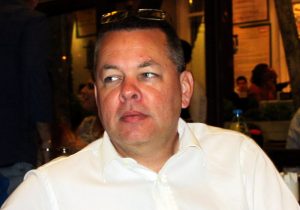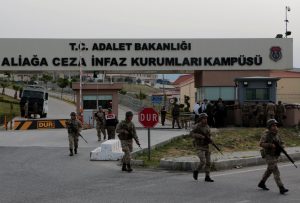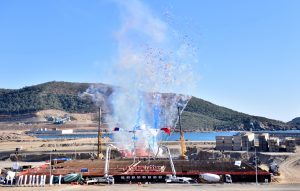
By Tuvan Gumrukcu
ANKARA (Reuters) – Turkey will retaliate if the United States enacts a proposed law that would halt weapons sales to the country, Foreign Minister Mevlut Cavusoglu said on Sunday.
Lawmakers in the U.S. House of Representatives released details on Friday of a $717 billion annual defense policy bill, including a measure to temporarily halt weapons sales to Turkey.
In an interview with broadcaster CNN Turk, Cavusoglu said the measures in the bill were wrong, illogical and not fitting between the NATO allies.
“If the United States imposes sanctions on us or takes such a step, Turkey will absolutely retaliate,” Cavusoglu said. “What needs to be done is the U.S. needs to let go of this.”
The proposed U.S. National Defense Authorization Act, which is several steps from becoming law, would ask the Defense Department to provide Congress with a report on the relationship between the United States and Turkey, and would block the sale of major defense equipment until the report was complete.
Turkey plans to buy more than 100 of Lockheed Martin’s <LMT.N> F-35 Joint Strike Fighter jets, and is also in talks with Washington over the purchase of Patriot missiles.
Turkey signed an agreement with Russia in December to buy S-400 surface-to-air missile batteries as part of Ankara’s plans to boost its defense capabilities amid threats from Kurdish and Islamist militants at home and conflicts across its borders in Syria and Iraq.
The move to buy S-400s, which are incompatible with the NATO systems, has unnerved NATO member countries, which are already wary of Moscow’s military presence in the Middle East, prompting NATO officials to warn Turkey of unspecified consequences.
Cavusoglu dismissed the warnings, saying Turkey’s relations and agreements with Russia were not an alternative to its ties with the West and accused the United States of trying to control Turkey’s actions.
“Turkey is not a country under your orders, it is an independent country… Speaking to such a country from above, dictating what it can and cannot buy, is not a correct approach and does not fit our alliance,” he said.
Relations between Ankara and Washington have been strained over a host of issues in recent months, including U.S. policy in Syria and a number of legal cases against Turkish and U.S. nationals being held in the two countries.
Last month, U.S. Secretary of State Mike Pompeo told Cavusoglu that the United States was seriously concerned over Ankara’s decision to buy the Russian S-400 missile batteries.
Cavusoglu said he would visit the United States next week to meet Pompeo, but added a specific date had not been set yet.
(Reporting by Tuvan Gumrukcu; Editing by Adrian Croft)











